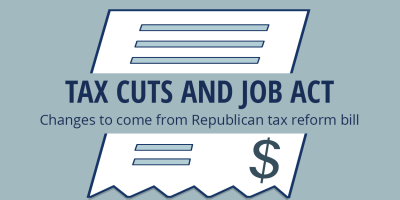By Beth McGuire
With less than a week until their Christmas deadline, House Republicans passed the converged Tax Cuts and Jobs Act bill—set to be the first tax overhaul in over 30 years—in a 227-203 vote on Dec. 19. However, the Senate Parliamentarian required a re-vote, citing three provisions in violation of the Senate Byrd rule. The Senate voted late Tuesday night, winning along party lines in a 51-48 vote, and the House voted again on Dec. 20 after the provisions in question were amended by the Senate. After it was enrolled, the bill made its way to President Trump’s desk to be signed into law.
Create your own user feedback survey
The real estate community, especially the National Association of REALTORS® (NAR), has advocated for a tax reform bill that protects homeowners. While some of the final provisions in the Tax Cuts and Jobs Act are an overall improvement to tax policy changes that were initially proposed in the Senate and House bills, NAR does not believe they are enough to truly benefit the homeowner community.
“The final tax reform bill is far from perfect, but it’s been greatly improved for homeowners over previous versions,” said NAR President Elizabeth Mendenhall in a statement. “REALTORS® should be be proud of the good work they did to help get us here. We generated over 300,000 emails to members of Congress through two calls for action and held countless in-person meetings with legislators, all of which helped shape the final product.
“The results are mixed,” Mendenhall said. “We saved the exclusion for capital gains on the sale of a home and preserved the like-kind exchange for real property. Many agents and brokers who earn income as independent contractors or from pass-through businesses will also see a significant deduction on that business income.
“Despite these successes, we still have some hard work ahead of us,” said Mendenhall. “Significant legislative initiatives often require fixes to address unintended consequences, and this bill is no exception.
“The new tax regime will fundamentally alter the benefits of homeownership by nullifying incentives for individuals and families while keeping those incentives in place for large institutional investors,” Mendenhall said. “That should concern any middle-class family looking to claim their piece of the American Dream. REALTORS®’ work to help them get there will continue, and we look forward to joining members of Congress from both sides of the rotunda on that endeavor.”
American taxpayers could see an impact on their paychecks as early as the next couple of weeks. The new bill lowers the tax brackets, which will mean less money taken out of some paychecks. Most changes, however, will become apparent when U.S. residents go to file taxes in 2019 for the 2018 tax year. The numbers will change over time, as well. The Tax Policy Center estimates that although individual taxes would be reduced, on average, in 2018, more than half of households will experience a tax increase by 2027.
Here are some of the major changes Americans can expect from the new tax policy:
- Eliminates …read more
From:: Finance and Economy


